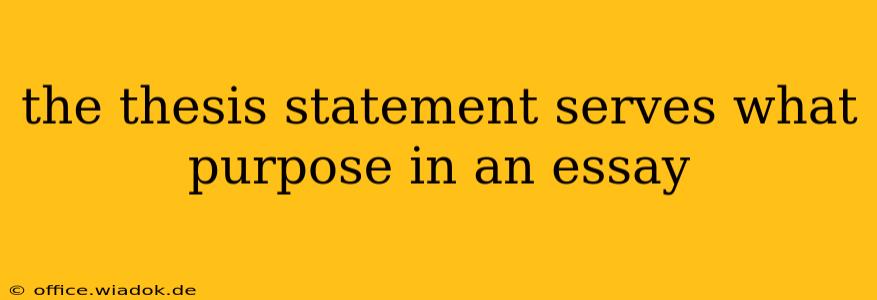The thesis statement is arguably the most crucial sentence in any essay. It's the cornerstone upon which your entire argument rests, acting as a roadmap for both you, the writer, and your reader. Understanding its purpose is key to crafting a compelling and effective essay. This post will explore the multifaceted roles of the thesis statement, offering insights into its importance and how to write one effectively.
What Does a Thesis Statement Do?
At its core, a thesis statement serves several vital purposes:
1. It Presents Your Central Argument:
This is the primary function. Your thesis statement clearly and concisely states the main point or claim you'll be arguing throughout your essay. It's not simply a topic statement (e.g., "The effects of climate change"); rather, it's a specific, arguable assertion about that topic (e.g., "The effects of climate change are most acutely felt in coastal communities due to rising sea levels and increased storm frequency").
2. It Provides Focus and Direction:
A strong thesis statement acts as a guide, keeping both you and your reader on track. It prevents you from straying off-topic and helps ensure that all your supporting evidence directly relates to your central argument. For the reader, it establishes the essay's purpose and scope from the outset.
3. It Organizes Your Essay's Structure:
The thesis statement naturally dictates the structure of your essay. Each paragraph should develop and support a specific aspect of your thesis, leading to a cohesive and logical flow of ideas. Think of it as the blueprint for your essay's construction.
4. It Establishes Your Credibility:
A well-crafted thesis statement demonstrates your understanding of the subject matter and your ability to formulate a clear and concise argument. It showcases your analytical skills and establishes you as a knowledgeable and credible voice on the topic.
5. It Engages the Reader:
A compelling thesis statement piques the reader's interest and encourages them to continue reading. It sets the stage for an engaging and thought-provoking essay, promising a worthwhile exploration of the topic.
Crafting an Effective Thesis Statement: Key Considerations
A successful thesis statement is:
- Clear and Concise: Avoid jargon and ambiguity. Express your argument in straightforward language.
- Specific and Focused: Avoid broad generalizations. Target a manageable scope for your essay.
- Arguable and Debatable: Present a claim that can be supported with evidence and that isn't simply a statement of fact.
- Well-Supported: Ensure you have sufficient evidence to back up your claim throughout your essay.
By understanding and effectively utilizing the thesis statement, you can significantly enhance the clarity, coherence, and overall impact of your essays. It's the foundation upon which all successful essays are built.

